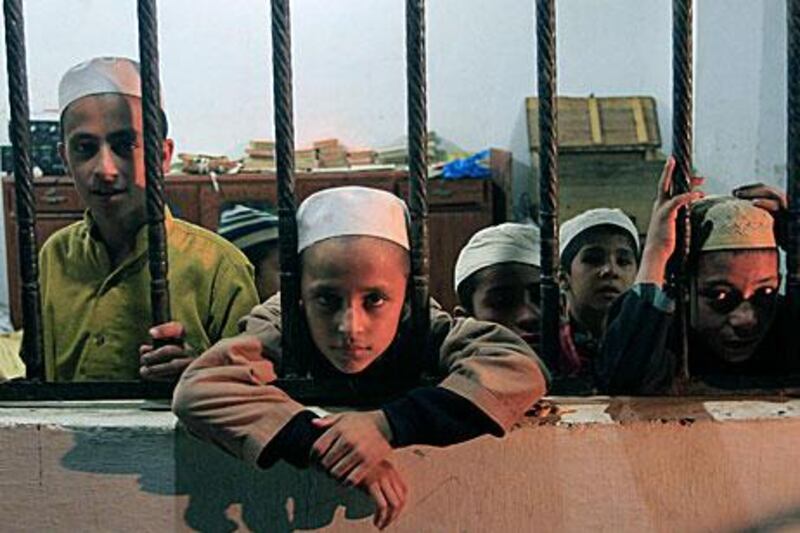KARACHI // Children as young as seven were among 53 students found chained in the basement of a madrassa raided by security forces in Karachi.
The youths said they were regularly beaten at the school, which was equipped with chains, hooks and a warren of basement rooms.
The head of an education federation called it a "torture cell".
Police said 21 teenagers were among those found during the raid on the self-styled seminary in Pakistan's biggest city.
Two children aged seven and another of about eight were among those rescued, said Naeem Akram, the deputy inspector general of Karachi police.
Madrassas, which provide the poorest families with the only education they can afford, are not tightly regulated in Pakistan and have served as recruitment grounds for the Taliban and other Al Qaeda-linked terror groups.
Police said the students were chained up because they were drug addicts whom the madrassa "wanted to rehabilitate", but many details remain unclear.
The three-storey building is in northern Karachi, isolated from the city's congested and densely populated areas, meaning there were no neighbours who could corrobate details of the police raid.
The basement was a maze of rooms with chains and hooks littered about.
Accounts given by students and relatives indicated that impoverished families believed the madrassa could offer treatment to drug addicts and a religious education to the youngest boys.
Azmat Ulla, 17, said his father sent him there because he suffered fits and could be violent.
"My father took me to several spiritual healers who said I was a victim of black magic," Azmat said. "Three months ago I was admitted here.
"My father pays 3,000 rupees (Dh125) per month to the madrassa as a fee to make me a normal person but I still suffer from fits and despite that they kept me chained and beat me with sticks ruthlessly."
Mohammad Ashraf said he had sent his eight-year-old son, Mushtaq Ahmed, to the madrassa believing he would receive a religious education. "I didn't know the madrassa management would beat him so mercilessly," he said. "I will no longer keep my son in this madrassa."
His son, Mushraq, said the teachers beat the students daily.
"I don't know why they kept young children with adults here."
Akram Khan, a policeman, said it was a "complex situation" and there would be "no clear picture until police collect all the evidence".
"Relatives of the elder boys and men say they had sent them for drug addiction rehabilitation, while younger children's relatives say they were sent for religious studies," he said.
Hanif Jullandhri, head of a federation of Pakistani madrassas, said the premises was not registered. "We strongly condemn this and urge the government to take the harshest possible action against its owners," he said. "The government should investigate how such torture cells are established and operated."
At least 15,148 seminaries in Pakistan educate more than two million students - about five per cent of the 34 million children in formal education - according to official statistics.
But officials suspect thousands more go unregistered, providing sons of Pakistan's poverty-stricken majority with the only education they can afford.





